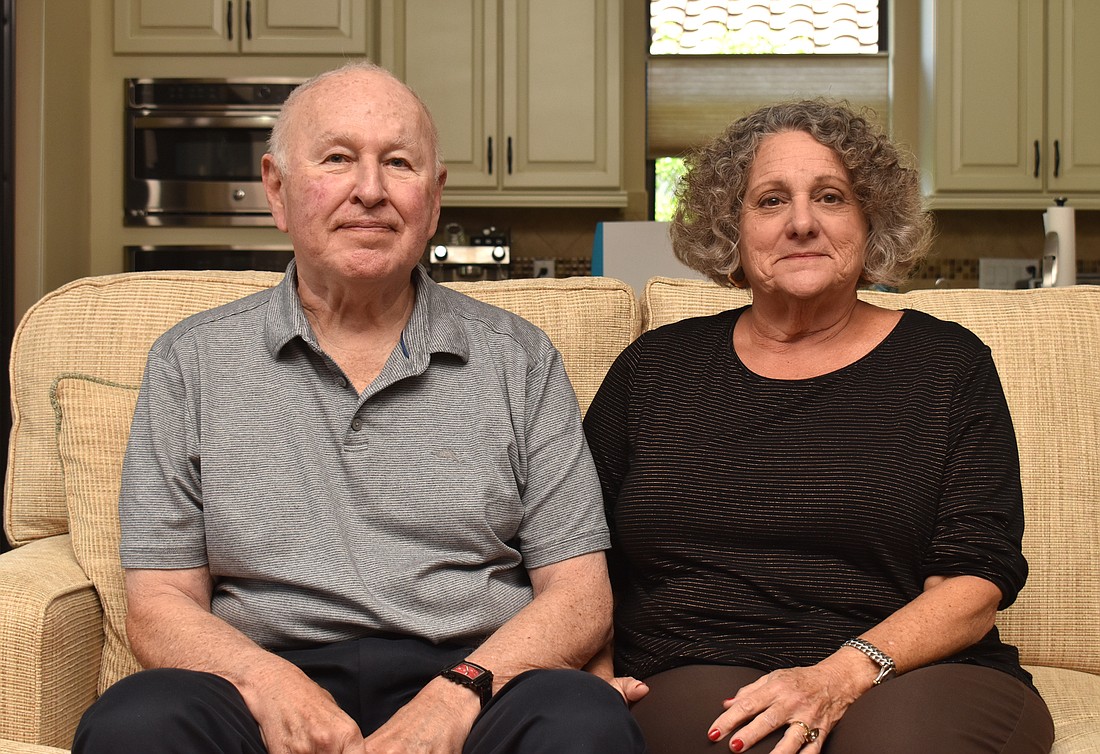- March 13, 2025
-
-
Loading

Around Christmas 1995, Julie Cook Downing’s mother was diagnosed with Alzheimer’s.
As an only child, Cook Downing decided she was going to help her then 84-year-old father care for her mother, and the
nearly 400-mile distance between them wasn’t going to stop her.
She cared for her mother until she died, but two years after her mother’s death, her father suffered several strokes that caused blank memories and again, Cook Downing took on the long-distance caregiver role.
Eventually, her father moved in with her and her husband, and she cared for her father until his death in 2006.
Now, after Cook Downing’s many caregiving experiences in a variety of situations such as skilled nursing, independent living, assisted living and memory care, she has become a caregiver adviser and support group facilitator.
Her free support group meets at Doctors Hospital of Sarasota, and while there, participants discuss the hardships of caregiving.
The No. 1 thing the group does, Cook Downing said, is prioritize the caregivers who often don’t prioritize themselves.
Dick Pelton, whose mantra in life is to have a purpose, found prioritizing himself a challenge.
Pelton, a founder of The Paradise Center on Longboat Key, has found that having a purpose is necessary when being a caregiver.
Pelton’s wife was diagnosed with mild cognitive impairment in 2010, which led to dementia. In turn, he became her caretaker.
He began going to a support group and caregiver course at The Friendship Centers. There, he learned tips, like counting to 10 to calm down when overwhelmed or frustrated.
Additionally, the course prompted him to get out of the house and do something fun.
“Two-thirds of caregivers die before the person they’re caring for, that’s a fact,” Pelton said. “So there are tricks in here, things to do to force you to do something other than be a caregiver. …”
Each week, Pelton would set a goal, such as going to lunch and heading to the driving range for nine holes. Although he
didn’t always accomplish his goal, he said he learned that caring for his wife can’t be his only purpose in life. Eventually, he hired another caregiver to come to their home six days a week before moving his wife to a memory care facility in 2015.
Because of the stress placed on caregivers, Cook Downing said they have the same biomedical risk as a smoker. The way to combat this, she said, is for caregivers to make themselves a priority.
“My philosophy to the caregivers is that when someone can no longer take care of their regular daily activities, you are in charge and you need to paste that on your forehead,” Cook Downing said. “You’re in charge, not them.”
Some simple ways caregivers can prioritize themselves include making time to run errands or do something enjoyable, Michael Fitzgerald, director of behavioral health at Serenity Place at Doctors Hospital, said.
Group support is something that Fitzgerald said is integral to the caregiving experience, especially after a patient has died.
“There’s strength in understanding that there’s commonality that exists within a group of people,” Fitzgerald said. “It’s kind of like a tribe. If you’ve got a group of people who are experiencing a similar loss, even if it’s not exactly the same, there’s an identity that somebody can actually feel.”
On a larger level, Cook Downing said caregivers need to understand their boundaries with a patient and plan accordingly.
“One of the biggest deficiencies of a caregiver is not reaching out for help,” Cook Downing said. “Caregivers need to make a list of people they know with the talents they have and match those talents up with what they need.”
Beth Shimlock, who cares for her husband who has Parkinson’s disease, said at first the diagnosis was scary and
overwhelming. To her, it seemed like it was her and her husband against the world.
Now, after her husband had two focused ultrasound brain surgeries in Switzerland, and they learned more about Parkinson’s through the Neuro Challenge Foundation, Shimlock said they are in a better place.
Shimlock has found that giving her husband some errands and chores keeps them both accountable.
“I just need to leave because he can get it done, but if I’m there, I want to take over,” she said. “I want to do it better. I want to talk louder. I want to be more organized, but he can still do it.”
No matter how caregivers choose to prioritize themselves, though, Cook Downing said they need to understand they are on a path that will end in the death of their loved one.
After a death, Fitzgerald said caregivers can experience a loss of identity because they have gotten so used to a caregiver role. The important thing to understand, he said, is that everybody grieves differently.
For those supporting a caregiver after the loss of a patient, Fitzgerald said the best thing to do is be a good listener and encourage the caregiver to stay connected with someone they trust.